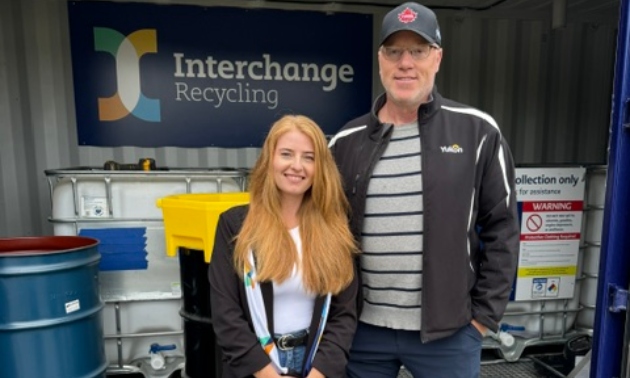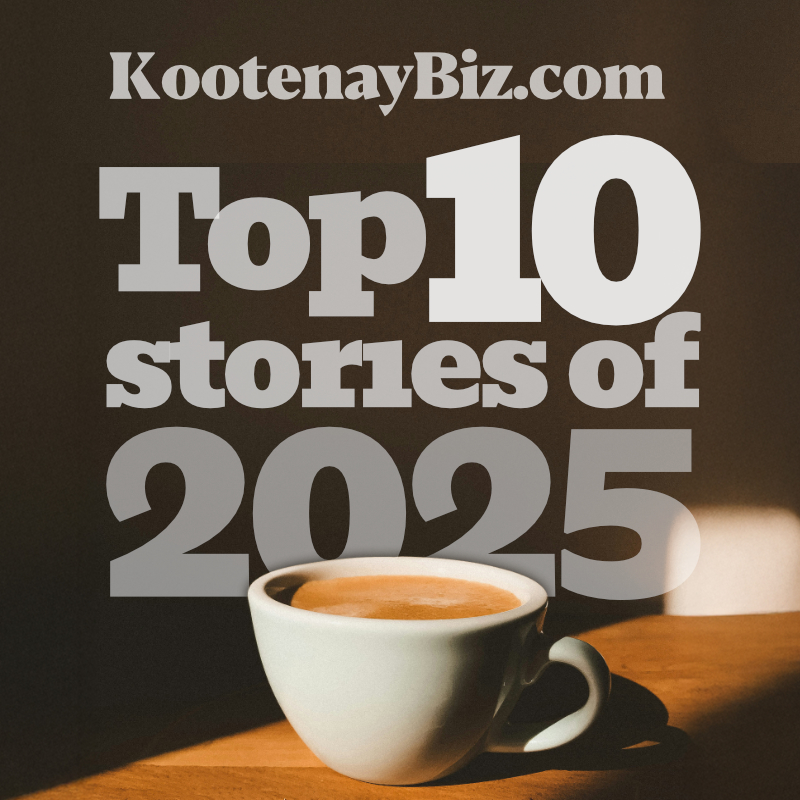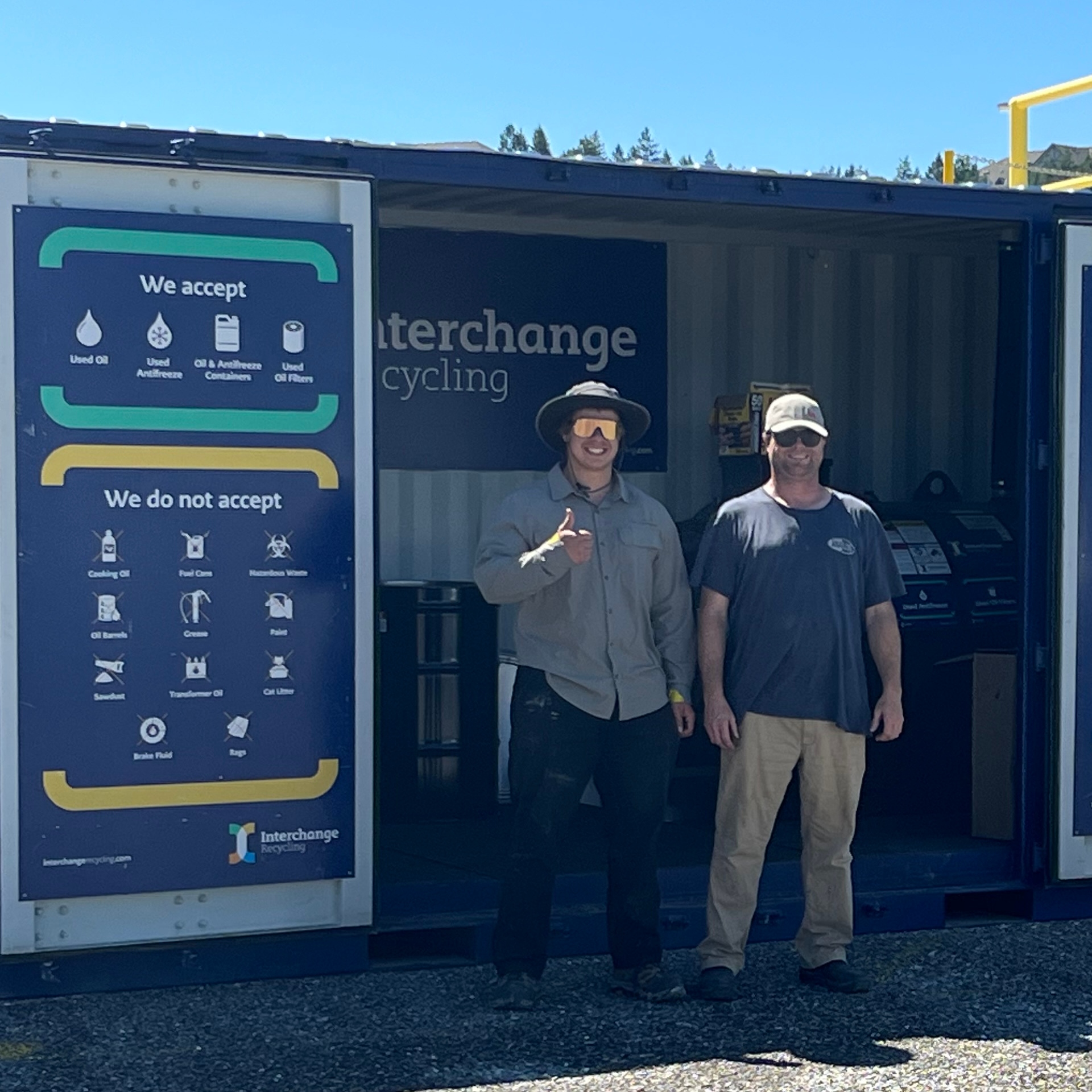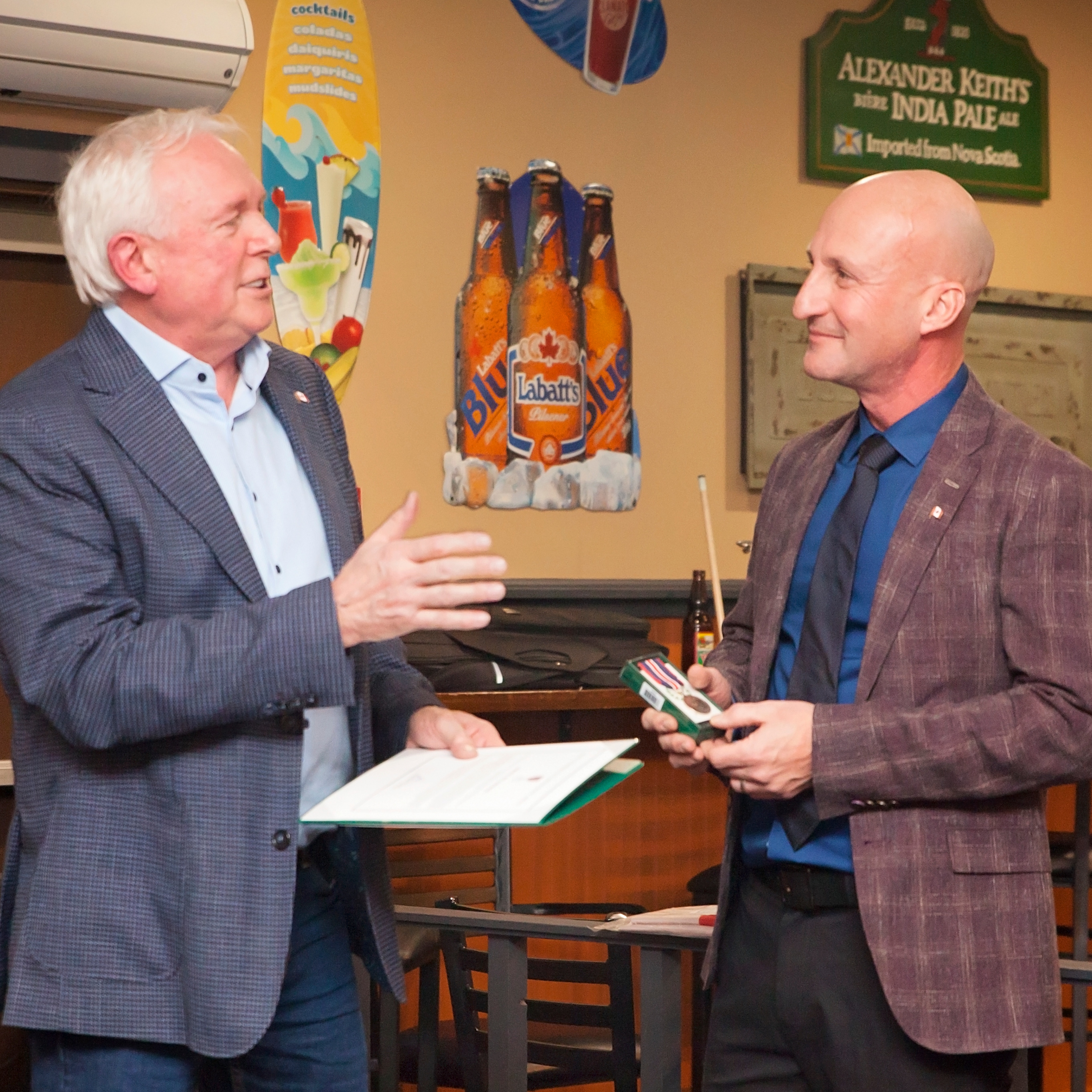Turning waste into opportunity: Inside Interchange Recycling’s environmental mission
From Radium to Whitehorse, Jenn Robson is helping communities recycle responsibly and sustainably

Jenn Robson, Director of Operations, and Hon. Nils Clarke at the recent Yukon launch event. — Photo courtesy of Interchange Recycling
Recycling isn’t always top of mind when people think about motor oil, antifreeze, or oil filters, but it should be. These everyday automotive products are among the most hazardous if improperly disposed of, and yet they’re also some of the most recyclable. In British Columbia, Interchange Recycling is leading the charge in making sure these materials are kept out of landfills, waterways, and soil, while also keeping valuable resources in circulation.
We sat down with Jenn Robson, Director of Operations at Interchange Recycling, to discuss how the organization is reshaping used-oil recycling in B.C. and beyond. From new infrastructure in the East Kootenay to a permanent facility in Whitehorse, Yukon, Interchange Recycling is proving that with the right systems in place, recycling can be both simple and impactful.
How does Interchange Recycling differ from other recycling programs in B.C.?
Interchange Recycling is a non-profit, producer-governed organization, driven by our members’ environmental goals, not profit margins. We give British Columbians a simple, free, eco-friendly way to recycle used motor oil, oil filters, antifreeze, and related containers.
Our reach is a key differentiator: a vast network of free, public recycling centres across the province. We support site operators with grants for infrastructure—like spill-proof containers, large collection tanks, and clear signage—ensuring facilities are safe, secure, and user-friendly.
We’re also part of a national network of provincial programs with a shared mission to recover valuable, non-renewable resources in a cost-effective, self-sustaining way that requires minimal government oversight. This model has helped build a strong, competitive private-sector recycling industry in Canada.
In B.C. alone, we recycle about 50 million litres of oil, 6 million oil filters, 3 million litres of antifreeze, and 1.7 million kilograms of plastic containers each year.
What does your role as Operations Director involve on a day-to-day basis?
On a typical day as Director of Operations, I oversee the establishment and management of recycling sites, including Interchange’s first permanent location in Whitehorse, Yukon, ensuring every facility operates smoothly, safely, and in compliance with environmental standards. I coordinate with local partners to set up infrastructure and events, communicate operational procedures to site staff and the public, handle logistics for material collection and shipping, and apply lessons learned in British Columbia to create accessible, convenient services that advance the circular economy.
What happens to used motor oil after it’s collected in the Kootenays?
It’s hard to believe now, but there was a time when used oil was just dumped or thrown away without a second thought. Today, we know that’s not only bad for the environment, it’s a waste of a valuable resource. When used motor oil is collected properly, it can be recycled and reused over and over again. For example, used antifreeze can be turned back into new automotive antifreeze and put right back into circulation. Oil filters are crushed, and the metal is sent to steel mills to be made into things like reinforcing steel. Even the plastic oil and antifreeze containers get a second life, being made into new containers, drainage tiles, and parking curbs.
How is this process helping reduce environmental harm, specifically in regions like the East Kootenay?
If used oil isn’t recycled properly, it can contaminate water, soil, and air, and once that damage is done, it’s difficult to undo. It’s also a waste of resources that we can’t replace. By making it easy for people to recycle oil and antifreeze products, we keep these materials out of landfills and in use where they belong. In the East Kootenay, for example, we recently upgraded the Radium Hot Springs transfer station with a brand-new 20-foot sea container, a 2,200-litre tank, and collection drums. It’s a safe, convenient way for residents to recycle and protect their local environment.
What does the new 20-foot container and tank in Radium Hot Springs mean for the local recycling network?
The Radium Hot Springs Transfer Station is in a great spot to serve surrounding communities, so this upgrade means it’s now even easier for residents to recycle responsibly. Having the right infrastructure in place makes all the difference—it keeps hazardous materials out of our environment and gives people the tools they need to do the right thing.
What’s the long-term vision for expanding collection infrastructure across the province?
99.4% of British Columbians already have reasonable access to a drop-off location for used oil materials. The long-term vision is to sustain that level while closing remaining gaps. Interchange Recycling identifies regions needing new facilities and partners locally to fill gaps, then standardizes equipment and training to raise safety and service quality province-wide. The Interchange Recycling program model relies on a network of private collectors and processors that compete to serve zones within the Province. Interchange’s role is to fund and set standards so the system remains robust and scalable. Beyond permanent collection facilities, Interchange Recycling also funds Community Round-Up Event grants to reach communities with limited infrastructure and to handle seasonal surges.
What can small businesses—like mechanics or fleet operators—do to ensure they’re recycling properly?
Small businesses such as mechanics and fleet operators can ensure they are recycling properly by working directly with registered Interchange Recycling Collectors for larger volumes of material. For smaller volume, small businesses can use return collection facilities, or Community Round-Up Events to recycle their approved materials like used oil, antifreeze, filters, and containers; they must keep all fluids separate, store materials in clearly labeled, sealed containers, and follow the program’s guidelines on contamination prevention to ensure materials are accepted and processed correctly.
Are there any local success stories or metrics that really highlight the impact?
One of our biggest local success stories is the continued growth and accessibility of oil and antifreeze recycling in British Columbia, including right here in the East Kootenays. In 2024, Interchange Recycling collected more than 47.7 million litres of used oil and over 3 million litres of antifreeze across the province, with the East Kootenay region alone contributing more than 1,478,577 litres of used oil alongside significant volumes of filters, containers, and antifreeze.
Recent infrastructure upgrades in the region include a new 20-foot sea container and 2,200-litre storage tank at the Radium Hot Springs Transfer Station, and the addition of a sea can, 2,200-litre oil tank, and antifreeze container at the Fernie Transfer Station. These projects make drop-off safer, more convenient, and available year-round. Access is also enhanced throughout neighbouring regional districts through Community Round-Up events, with 2025 stops planned in Creston, Nakusp, Silverton, Castlegar, and Kaslo. This combination of local infrastructure investment and strong participation shows the real impact of the program in keeping valuable resources out of the waste stream and protecting the environment.
What innovations or changes are you excited about in the next few years?
One of the things I’m most excited about is our recent expansion into a new jurisdiction here in Canada. On August 1st, 2025, Interchange Recycling officially marked the expansion of our Extended Producer Responsibility program into the Yukon.
Our approval by the Yukon Environment Protection and Assessment Branch earlier this year was one of the first for an EPR program in this region. It speaks to the territory’s growing commitment to sustainable waste management and its ambitious targets to reduce per capita waste and improve landfill diversion. We're proud to play a part in helping Yukon reach those goals.
A permanent facility was opened in Whitehorse, and its just the beginning. To make sure our services are truly accessible to all Yukoners, we’ll be rolling out regular collection events outside of Whitehorse - working closely with local partners to serve as many residents as we can. We have our first three collection events confirmed: August 5 in Teslin, September 13th in Watson Lake and Sept 20 in Faro. Plus many more to come.
How can everyday British Columbians help strengthen the impact of Interchange’s work?
The easiest way to help is simply to recycle your used motor oil and related products. The process is straightforward and completely free—just seal your used oil in a recyclable container and drop it off at your nearest return facility. You can find all the locations on our website at interchangerecycling.com.
If you could leave residents with one key message about used oil recycling, what would it be?
Recycling your used oil is one of the simplest things you can do to protect the environment. Throwing it away or dumping it isn’t just harmful—it’s wasteful. By recycling, you’re keeping hazardous materials out of our communities, saving valuable resources, and contributing to better environmental and economic outcomes for everyone. And best of all—it doesn’t cost you a thing.





Comments